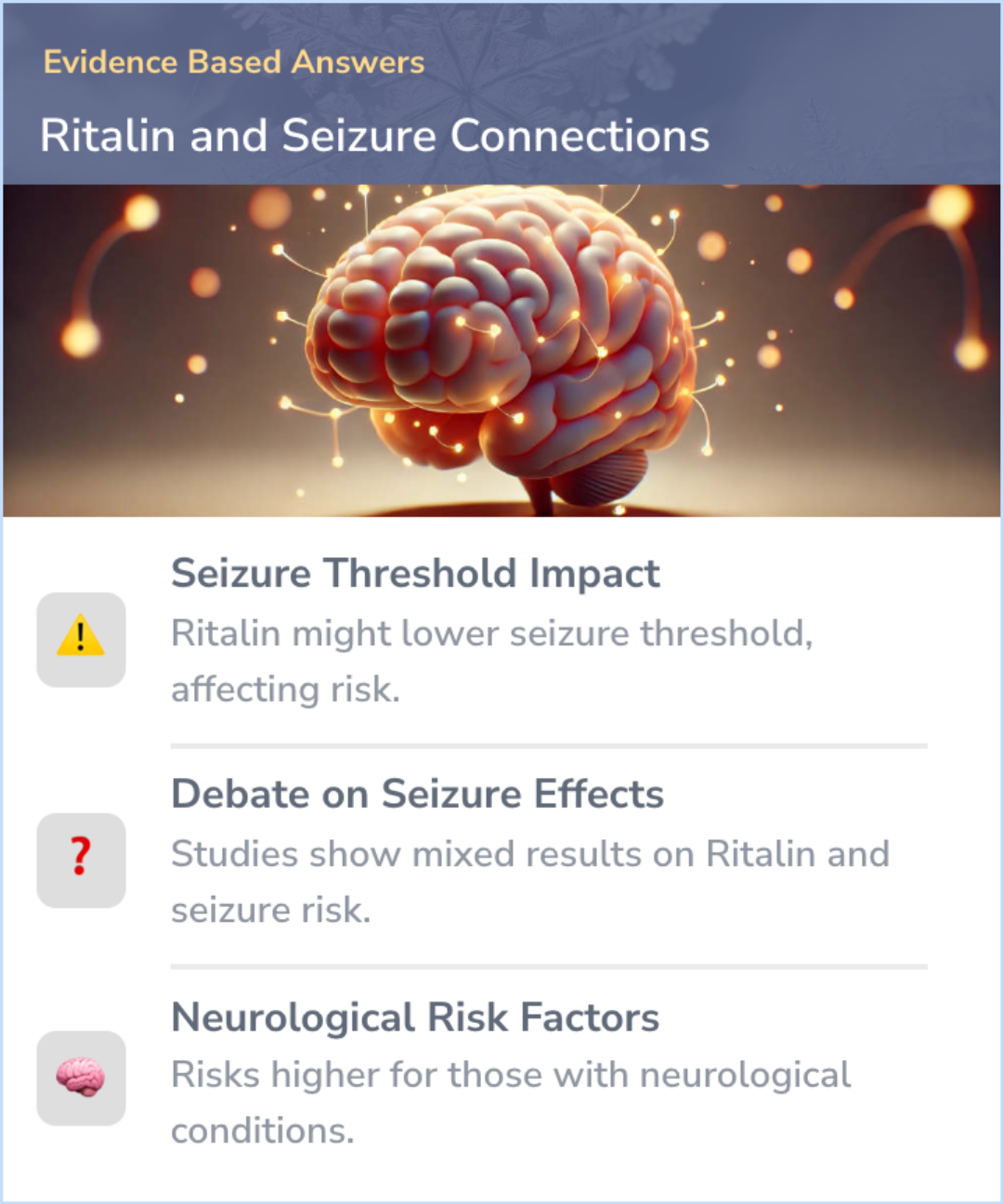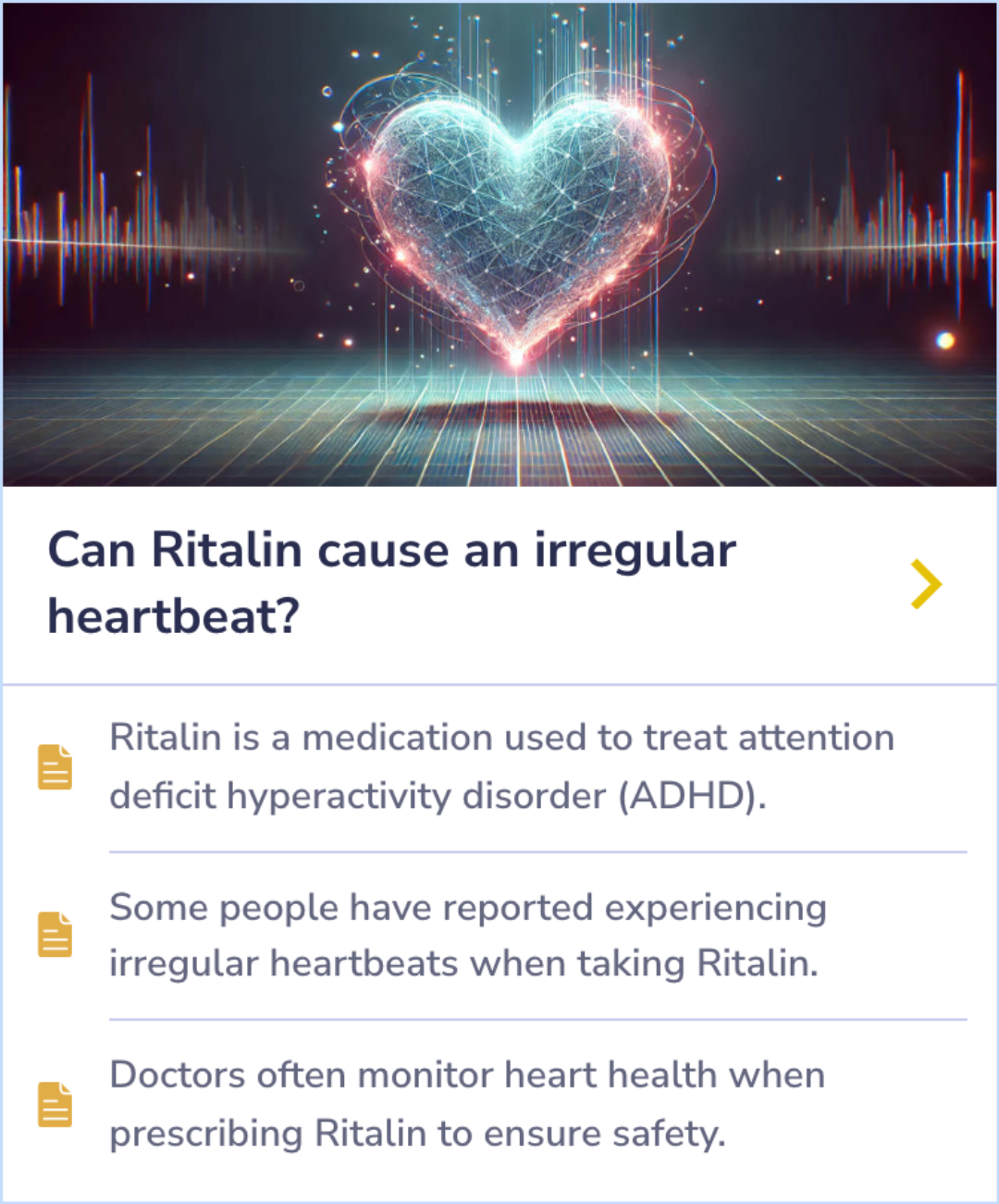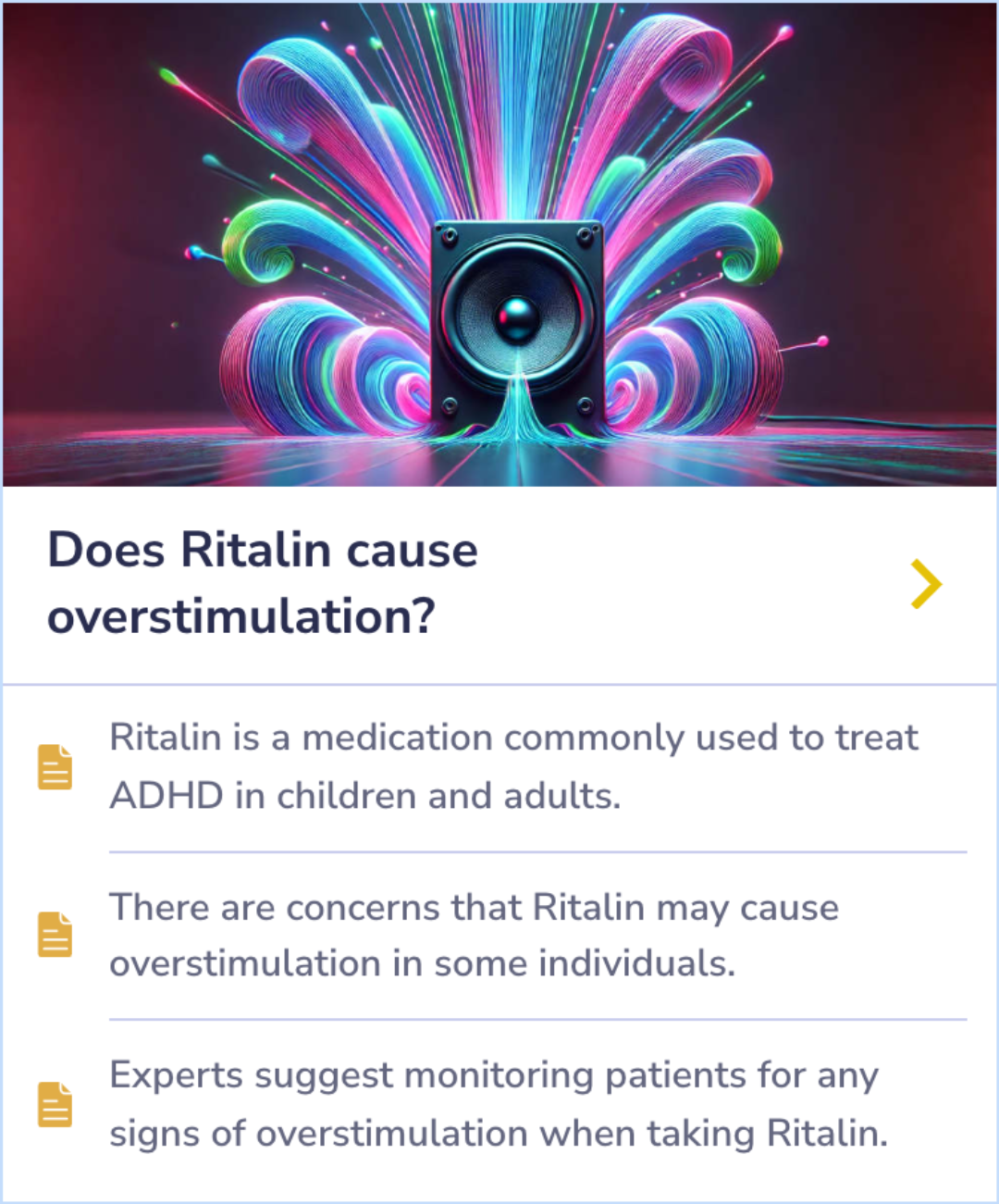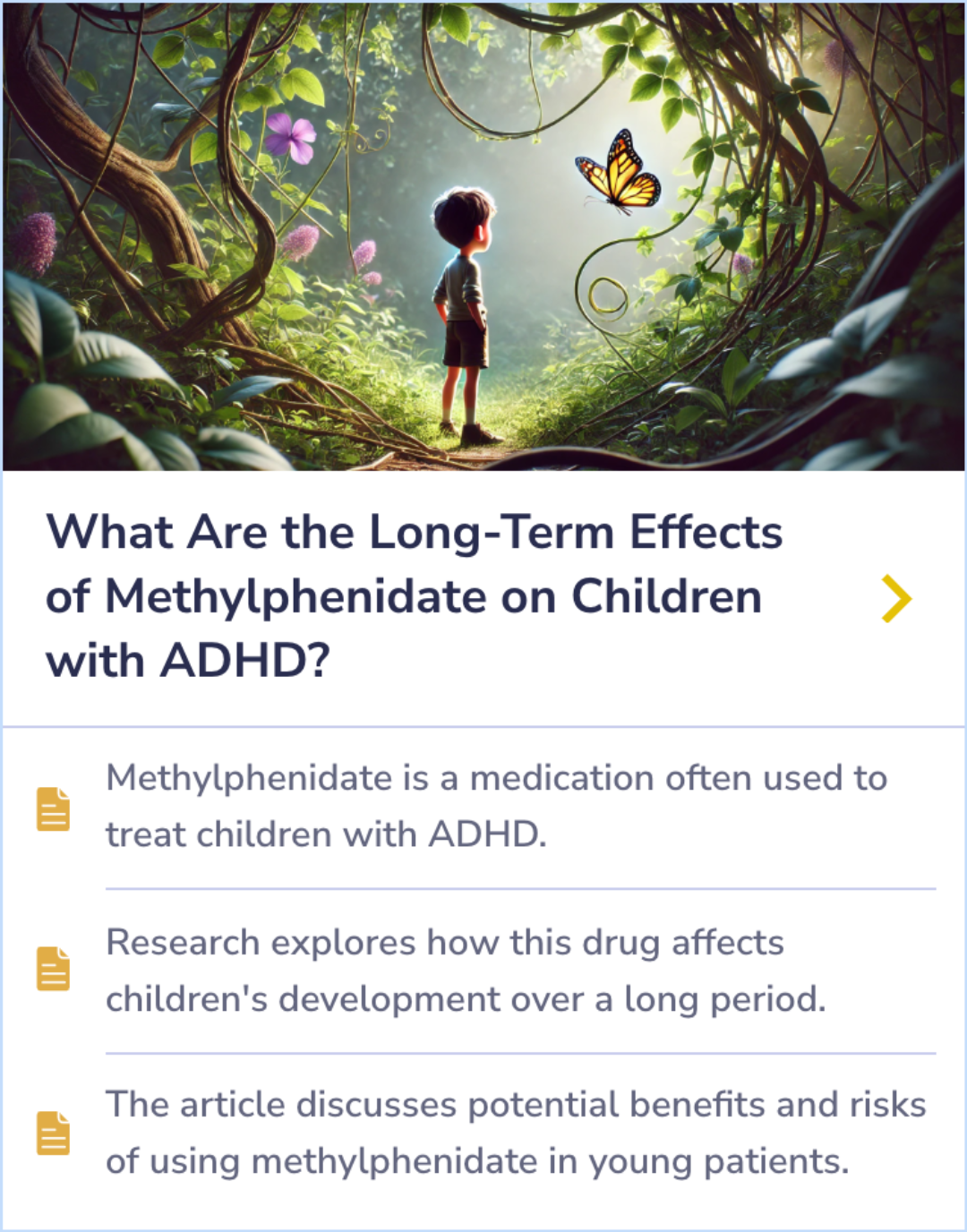Ritalin
Evidence Based Answers
Can Ritalin cause a seizure?
Ritalin may lower the seizure threshold, potentially increasing risks for individuals with prior neurological concerns. Research shows mixed results, leading to suggestions of careful patient evaluation.
Click to explore a section:

Ritalin's seizure risk may rise for those with past neurological issues.
Seizure Risk with Ritalin
Ritalin (methylphenidate) may lower the convulsive threshold, which can increase the risk of seizures in some people. This is more likely for those with a seizure history or abnormal EEG (brainwave) activity, though it can rarely happen in people without these risk factors.
If a seizure occurs during Ritalin use, it is recommended to stop taking the medication immediately and consult with a healthcare provider.
If a seizure occurs during Ritalin use, it is recommended to stop taking the medication immediately and consult with a healthcare provider.
“
Source Quotes:
There is some clinical evidence that stimulants may lower the convulsive threshold in patients with prior history of seizures, in patients with prior EEG abnormalities in absence of seizures, and, very rarely, in patients without a history of seizures and no prior EEG evidence of seizures.,In the presence of seizures, the drug should be discontinued.
Controversy Around Seizure Threshold with Ritalin
There is debate over whether Ritalin significantly affects seizure risk. Some studies suggest it may lower the convulsive threshold, while others find inconsistent results. This highlights the need for individual patient evaluation, especially for those with a seizure history.
If seizures develop, stopping methylphenidate immediately is recommended to ensure patient safety.
If seizures develop, stopping methylphenidate immediately is recommended to ensure patient safety.
“
Source Quotes:
Controversial evidence exists regarding the potential for methylphenidate to affect seizure threshold.,If seizures develop while being treated with methylphenidate, the prescribing clinician should immediately stop the drug.
Ritalin Use and Neurological Risks
People with neurological conditions may have increased risks with Ritalin use, due to its potential effect on the convulsive threshold. This is particularly concerning for individuals with a history of seizures or irregular brainwave activity.
Healthcare providers must carefully consider the potential for seizure risk when evaluating Ritalin use.
Healthcare providers must carefully consider the potential for seizure risk when evaluating Ritalin use.
“
Source Quotes:
There is some clinical evidence that stimulants may lower the convulsive threshold in patients with prior history of seizures, in patients with prior EEG abnormalities in absence of seizures, and, very rarely, in patients without a history of seizures and no prior EEG evidence of seizures.
Comparing Seizure Risks Among Stimulants
Different stimulants, including Ritalin, have varying levels of seizure risk. Some medications, like bupropion, may carry a higher seizure risk, especially at high doses or with certain conditions. Comparing these risks can guide safer medication choices based on individual needs.
Adjustments to therapy may help balance seizure risk with symptom management.
Adjustments to therapy may help balance seizure risk with symptom management.
“
Source Quotes:
Bupropion may increase the risk of seizures, particularly with higher doses and shorter-acting formulations and in patients with eating disorders.
Key Takeaways
Conclusions
Ritalin, a common stimulant medication, may lower the seizure threshold, increasing the risk of seizures in individuals, particularly those with a history of seizures or abnormal brainwave patterns.
Conflicting study results highlight the necessity for tailored assessments of seizure risk in patients considering Ritalin. While risks vary among stimulants, stopping Ritalin immediately if seizures occur is advised.
Conflicting study results highlight the necessity for tailored assessments of seizure risk in patients considering Ritalin. While risks vary among stimulants, stopping Ritalin immediately if seizures occur is advised.

Evidence Summary
Ritalin and Heart Health: Monitoring Risks
Ritalin, used to treat ADHD, has been linked to reports of irregular heartbeats in some individuals. This highlights the importance of monitoring by healthcare professionals to ensure patient safety and respond to any potential issues quickly.
Some patients taking Ritalin have reported experiencing irregular heart rhythms, leading doctors to frequently monitor heart health to minimize risks and address concerns early.
Ensuring patient safety during treatment involves careful observation by medical providers to detect and manage any cardiac effects.
Some patients taking Ritalin have reported experiencing irregular heart rhythms, leading doctors to frequently monitor heart health to minimize risks and address concerns early.
Ensuring patient safety during treatment involves careful observation by medical providers to detect and manage any cardiac effects.
Evidence Summary
Monitoring Ritalin for Overstimulation Risks
Ritalin is widely prescribed to treat ADHD in both children and adults. However, some individuals may experience overstimulation, which can manifest in various ways. Monitoring patients closely is recommended to identify signs of overstimulation early.
Experts emphasize that careful oversight of Ritalin treatment can help manage any potential overstimulation effects, ensuring that therapy remains effective and safe.
Experts emphasize that careful oversight of Ritalin treatment can help manage any potential overstimulation effects, ensuring that therapy remains effective and safe.
Evidence Summary
Methylphenidate's Long-Term Impact on Children with ADHD
The article dives into how methylphenidate, a widely used ADHD medication for children, may impact long-term development. Researchers examine both potential benefits, like improved focus and behavior, and possible risks associated with prolonged use.
The discussion covers how this medication works over time and raises questions about how it could influence a young patient's growth and overall well-being.
Parents and caregivers might find this exploration of benefits and risks informative when considering treatment options.
The discussion covers how this medication works over time and raises questions about how it could influence a young patient's growth and overall well-being.
Parents and caregivers might find this exploration of benefits and risks informative when considering treatment options.


